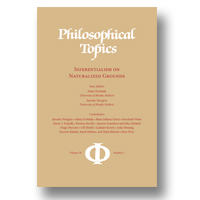|
22.
|
Philosophical Topics:
Volume >
47 >
Issue: 1
Diane E. Pataki
On the Definition of Cultivated Ecology
abstract |
view |
rights & permissions
| cited by
Sagoff (2017) critiqued the exclusion of cultivated plants and animals from much of the body of work in ecology. However, there is a history of attempting to incorporate cultivated landscapes in ecology that goes back at least two decades, particularly in urban ecology. The subdiscipline of urban ecology has received relatively little attention in philosophy, although some of its methodologies, such as coupled human-natural systems research, have been critiqued. Here I will attempt to explicitly address the conceptual limitations in ecology for studying cultivated ecosystems and evaluate these limitations in the context of coupled human-natural systems and socioecological research, urban ecosystem services frameworks, and actor-network theory. I argue that the history of cultivated organisms is highly germane to their ecology, necessitating the incorporation of human agency into ecological theory. However, human agency and nonhuman nature exist along a continuum of nature vs. culture. As a result, dualistic approaches to studying the role of human agency in ecosystem processes, such as socioecology and ecosystem services assessments—which explicitly separate humans from nature—have had limited success in cultivated landscapes. More fully integrated frameworks such as actor-network theory may better address ecological research questions in cultivated landscapes.
|
|
|
23.
|
Philosophical Topics:
Volume >
47 >
Issue: 1
Carolyn A. Trombley, Karl Cottenie
Quantifying the Scientific Cost of Ambiguous Terminology in Community Ecology
abstract |
view |
rights & permissions
| cited by
Fundamental terms in the field of ecology are ambiguous, with multiple meanings associated with them. While this could lead to confusion, discord, or even tests that violate core assumptions of a given theory or model, this ambiguity could also be a feature that allows for new knowledge creation through the interconnected nature of concepts. We approached this debate from a quantitative perspective, and investigated the cost of ambiguity related to definitions of ecological units in ecology related to the general term “community.” We did a meta-analysis of tests associated with two bodies of literature, Hubbell’s unified neutral theory of biodiversity and biogeography and Diamond’s assembly rules, that rely on a specific ecological unit that assumes that species are existing within a local area and that they have overlapping resource needs. We predicted that if ambiguous terminology is widespread, then researchers will have tested them with many different ecological units, that in addition some of these ecological units will violate the core assumptions of the theory, and finally that the overall level of support for a theory will be stronger if appropriate ecological units were used. We found that indeed multiple different ecological units were used in the literature to test both theories, with 65 percent appropriate ecological units for neutral theory tests, and only 6 percent for assembly rule tests. Finally, there was some evidence that the support for a theory depended on whether appropriate ecological units were used for neutral tests, but there was not enough data for the assembly rule tests. These results thus show that ambiguous terminology in ecology is having measurable effects on research and is not of solely philosophical concern. We advocate that authors be explicit in their writing and outline core assumptions of theories, that researchers apply these consistently in their tests, and that readers be attentive to what is written and cognizant of their potential biases.
|
|
|
24.
|
Philosophical Topics:
Volume >
47 >
Issue: 1
Mark Vellend
The Behavioral Economics of Biodiversity Conservation Scientists
abstract |
view |
rights & permissions
| cited by
Values have a profound influence on the behaviour of all people, scientists included. Biodiversity is studied by ecologists, like myself, most of whom align with the “mission-driven” field of conservation biology. The mission involves the protection of biodiversity, and a set of contextual values including the beliefs that biological diversity and ecological complexity are good and have intrinsic value. This raises concerns that the scientific process might be influenced by biases toward outcomes that are aligned with these values. Retrospectively, I have identified such biases in my own work, resulting from an implicit assumption that organisms that are not dependent on natural habitats (e.g., forests) effectively do not count in biodiversity surveys. Finding that anthropogenic forest disturbance reduces the diversity of plant species dependent on shady forests can thus be falsely equated with more general biodiversity loss. Disturbance might actually increase overall plant diversity (i.e., including all of the species found growing in a particular place). In this paper I ask whether ecologists share values that are unrepresentative of broader society, I discuss examples of potential value-driven biases in biodiversity science, and I present some hypotheses from behavioral economics on possible psychological underpinnings of shared values and preferences among ecologists.
|
|
